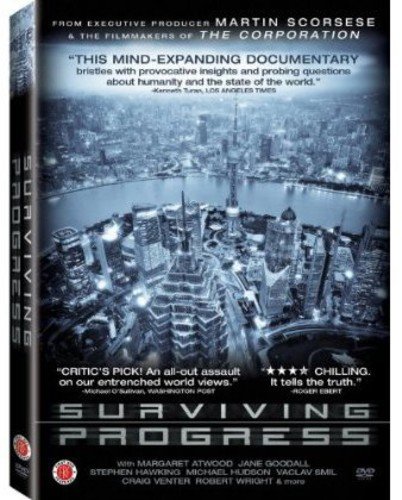
Written by Mary K. Williams
“We tend to delude ourselves that these changes always result in improvements from the human point of view” – Ronald Wright.
Surviving Progress is an examination of the impact of the constant advances made by humans since we first started rubbing sticks together to create fire. Executive produced by Martin Scorsese and Mark Achbar, this documentary is based on the bestseller A Short History of Progress by Ronald Wright. It is co-directed and co-written by Mathieu Roy and Harold Crooks.
The bulk of the film is narrated by Wright. His words are pitted against images of crowded cities, robotically-aided surgery, space exploration, and environmental police officers. There are some mesmerizing scenes, like a time-lapse sequence showing the repetitive and increasing development of highways and skyscrapers, an urban sprawl that resembles a virus rather than progress. Interspersed throughout are quotes from a host of varied experts: economists, cognitive psychologists, international environmentalists, and more.
Surviving Progress posits (via psychologist and The Birth of the Mind author Gary Marcus) that much of our brain mechanisms evolved before we had the ability to think into the future. And we still operate on “ancestral” brain function. This ‘fight or flight’ response allows no time to think about long-term consequences. And the consensus is that we still operate with a hunter-gatherer mentality.
Wright uses a classic example of our forerunners hunting mammoth. Turning sticks and flint into Stone Age weapons worked to kill a few of the beasts. But eventually someone realized that if they chase the whole herd off a cliff, they would kill many at once. At first it seems quite ingenious. But what happens when the multitude of carcasses begin to rot too fast? The food supply became severely depleted.
This is what Wright refers to as a “progress trap”. And these traps become the theme of the film. From the stripping of Amazon resources, to the machinations of Wall Street, Surviving Progress could be aptly re-titled Surviving Greed.
Sections of the film are a bit confusing, perhaps off-putting. It opens with a scene of lab chimpanzees working with blocks, and moves to various random and seemingly anonymous folks who stumble with the question “what is progress?” But eventually Roy and Crooks makes sense of it all. The nameless people are eventually identified as specialists and authorities such as Marcus, Jane Goodall, and J. Craig Venter (pioneer in human genome studies) among others.
Novelist Margret Atwood notes: “Instead of thinking that nature is this huge bank that we can just, this endless credit card that we can just keep drawing on, we have to think about the finite nature of that planet and how to keep it alive so that we too may remain alive. Unless we conserve the planet, there isn’t going to be any “the economy”.
The film poses hard questions. Did discovery of pasteurization and the cure of smallpox, which led to increased population, become a progress trap? Should we really have this many people on the planet? Reading between the lines, we start to wonder, should birth numbers per family be regulated globally? That is one very scary question, but the reality of overpopulation cannot be ignored.
Surviving Progress is meant to be a wake-up call. Of course, it seems like most of the world has continually hit the snooze button on these kinds of alarms, which does not make this a “feel-good” kind of movie. But there is hope. Stephen Hawking succinctly states, “We are entering an increasingly dangerous period of our history. Our genetic code still carries a cell fish with aggressive instincts that were a survival advantage in the past. But I’m an optimist.”
A brief note:
My personal interest in this film came from a growing concern about the increased presence of technology. Not so much regarding innovation or the exponential development of gadgets and gizmos, although the shadow of Big Brother falls further over us as the state of our personal privacy is ever tenuous. As we “allow”, “download”, and “share” various programs to make our lives simpler, we open up more of our information to God knows who and therefore must rely on not just the ‘kindness of strangers’ but on their ethics too.
What is really alarming about influence of the digital age on our everyday lives is the prediction that we as a society will grow increasingly inward, and at some point, mesh with the machines to such a point where we become unrecognizable as an upright-walking, opposable-thumb-using humans.
Surviving Progress opened in New York on April 6th and will begin a nationwide rollout on April 20th.